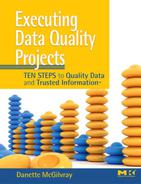Chapter 6 A Few Final Words
Start where you are
Use what you have
Do what you can.
– Arthur Ashe
From this book you have learned key concepts related to information quality, such as the Framework for Information Quality, the Information Life Cycle POSMAD, and the data quality dimensions. You have learned about The Ten Steps process, seen examples, and been provided templates to help you get started. Other techniques and tools to help with your information quality work and ideas for including data quality in your projects have been discussed as well.
If you really understand what has been presented here, your thinking about what information quality entails and its importance to your business has expanded. You will never see data quality in your organization quite the same way as you did before. Now you will be able to quickly assess a situation at a high level and yet be better able to dive into the detail when necessary. You will pick up new clues not noticed before and really understand the connections between data, processes, people and organizations, and technology.
![]() Key Concept
Key Concept
Sustaining information and data quality requires management support. It requires persistence, commitment, ongoing effort, and attention. It is not just a one-time project.
You will see the importance of including communications every step of the way, and you will understand that information is not trusted just because the application code is working correctly. You will recognize the perception of those utilizing the information, build their awareness, and earn their confidence. You will see that you can’t do it alone and so must communicate in order to continue to build support and increase your chances for success.
You will be better able to show business impact because you have seen that there are many different methods for addressing an issue; and you can find a way to articulate impact within the time, and with the resources, you have available.
If you are new to information quality, what you have learned here is a starting point. If you already have experience in this arena, your new knowledge will supplement your current information quality work. You will be able to take your previous data and information experience, pull in successful methods and techniques that worked for you in the past, and apply all of this to the many situations that will benefit from your efforts. You will take the ideas here, expand on them, and find new ways to apply them to benefit your organization. I hope this book has motivated you to explore and to continue to educate yourself in the many areas related to information quality.
I’ll borrow Michael Spendolini’s words in his preface to The Benchmarking Book1 because they apply here also:
As you gain experience with the process, many of the preparatory steps and technicalities become routine. What’s left is the process of discovery and learning, of developing networks of interesting people, of bringing new ideas into your own work and organization. It can be a very rewarding experience for people who are motivated to listen and learn.
The practical concepts, processes, and techniques presented here can be applied to any data or information that supports any part of your organization. And whether your organization is a for-profit business, a government agency, a nonprofit or charity, or an educational institution, all of the ideas apply—because every organization depends on information to support its goals and to deliver on its commitments.
I truly believe that, no matter where you are, there is something you can do to help your organization. I also recognize the fact that true sustainability of any data quality effort requires management support. But don’t be discouraged if you don’t have the ear of the CEO (of course that would be nice, but don’t let it stop you if you don’t). Let me suggest the following dos and don’ts:
- You DON’T have to have the CEO’s support to begin, but …
- You DO have to have the appropriate level of management support to get started while continuing to obtain additional support from as high up the chain as possible.
- You DON’T have to have all the answers, but …
- You DO need to do your homework and be willing to ask questions.
- You DON’T need to do everything all at once, but …
- You DO need to have a plan of action and get started!
So what are you waiting for? Get going: build on your experience, continue to learn, bring value to your organization, have fun, and enjoy the journey!
1Used with permission of AMACOM Books. From Michael J. Spendolini, The Benchmarking Book (1992, p. xii); permission conveyed through Copyright Clearance Center, Inc.
